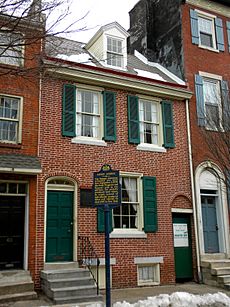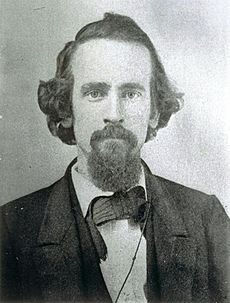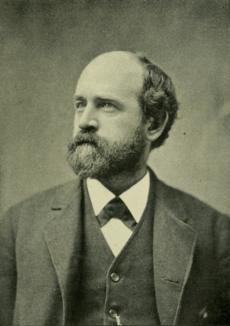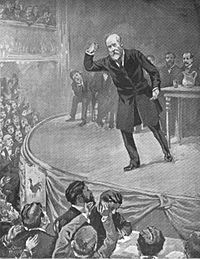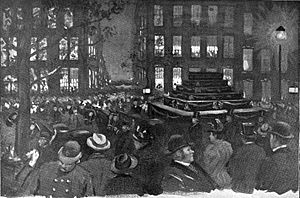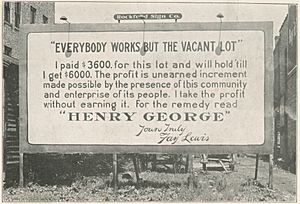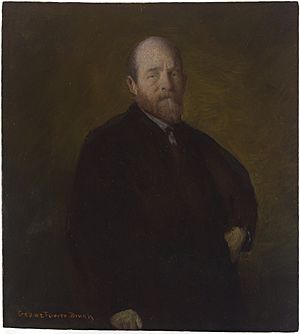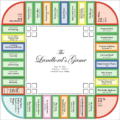Henry George facts for kids
Quick facts for kids
Henry George
|
|
|---|---|
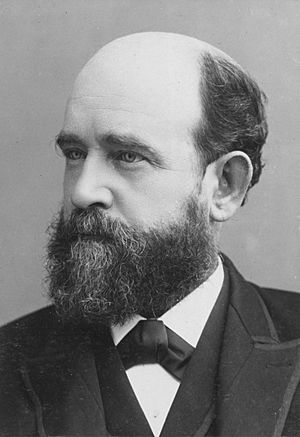 |
|
| Born | September 2, 1839 Philadelphia, Pennsylvania, US
|
| Died | October 29, 1897 (aged 58) New York City, US
|
| Education | Primary |
|
Notable work
|
|
| Spouse(s) | Annie Corsina Fox |
| Era | Modern philosophy
|
| Region | Western philosophy |
| School | Georgism |
|
Main interests
|
|
|
Notable ideas
|
|
Henry George (September 2, 1839 – October 29, 1897) was an American economist and journalist. He was very popular in the 1800s and inspired many reform movements. He is known for an idea called Georgism. This idea says that people should own the value they create themselves. But the economic value of land (including natural resources) should belong to everyone in society. George believed that a special tax on land values would make society fairer and more productive.
His most famous book, Progress and Poverty (1879), sold millions of copies. In this book, George explored why poverty and inequality grew even as society became more advanced. He suggested that taxing the value of land, and other anti-monopoly ideas, could help solve these problems.
George also wrote about supporting free trade, the secret ballot (private voting), and public ownership of certain services.
He was a journalist for many years. His popularity led him to run for Mayor of New York City in 1886 and 1897. He did well in the first election, even beating Theodore Roosevelt. After his death, his ideas were continued by groups and leaders in the United States and other English-speaking countries. An economist named George Soule said George was "the most famous American economic writer" of his time.
Contents
Henry George's Life Story
Henry George was born in Philadelphia in 1839. His family was not rich. He was the second of ten children. His father was a religious publisher. Henry went to the Episcopal Academy but left at age 14. He preferred to read and attend lectures.
In April 1855, at age 15, he went to sea as a sailor. He traveled to Melbourne and Calcutta. In 1858, he moved to California. He thought about looking for gold but instead became a typesetter in San Francisco.
In California, Henry met Annie Corsina Fox from Australia. They fell in love and married on December 3, 1861. Annie's uncle did not approve because Henry was poor.
They had four children. Their son, Henry George Jr. (1862–1916), later became a U.S. Representative. Another son was Richard F. George (1865–1912), who became a sculptor. Their daughters were Jennie George (c. 1867–1897) and Anna Angela George (1878-1947). Anna became the mother of famous dancer Agnes de Mille.
After his second child was born, Henry had no work and no money. He had to ask strangers for food. Once, he even thought about robbing someone if they wouldn't help him. Luckily, a man gave him five dollars.
Henry was raised as an Episcopalian. But he believed in "deistic humanitarianism," which means he believed in a God but focused on human values. His children were mostly influenced by his ideas.
Journalism Career
Henry George became a printer for the San Francisco Times. He quickly started writing articles. One popular article was What the Railroads Will Bring Us. He became a managing editor in 1867. He worked for several newspapers and even edited his own, the San Francisco Daily Evening Post, for four years.
His family struggled at first. But Henry's growing reputation in journalism helped them rise out of poverty.
Ideas on Politics and Economics
Henry George started as a Republican but later became a Democrat. He strongly criticized railroad and mining companies, corrupt politicians, and land speculators. He wrote about these views in 1868. He argued that railroads would only benefit a few rich people, leaving many others poor. This made him an enemy of the Central Pacific Railroad.
In 1871, while riding a horse, he looked out over San Francisco Bay. He noticed that land values were rising very fast. He also saw that poor people in older cities like New York were worse off than those in newer places like California. These observations led to his famous book, Progress and Poverty.
In his book, George argued that a lot of the wealth created by progress goes to land owners and monopolists. He believed this was the main reason for poverty. He thought it was unfair that people made money just by owning land, while productive work was heavily taxed. He suggested a land value tax. This tax would be on the value of the land itself, not on any buildings or improvements on it. This would stop people from profiting just by holding valuable land empty.
Political Life
In 1880, Henry George moved to New York City. He became friends with Irish nationalist groups. He traveled to Ireland and Scotland to give speeches about land rights.
In 1886, George ran for mayor of New York City. He was the candidate for the United Labor Party. He came in second place, beating Theodore Roosevelt. Many of his supporters believed the election was unfair. George ran for mayor again in 1897.
During his life, some communities in Delaware and Alabama were started based on his idea of a single tax on land. His ideas also influenced places like Australia, New Zealand, and Taiwan.
Death and Funeral
Henry George had his first stroke in 1890 after a worldwide speaking tour. This made him very weak. Despite this, he stayed active in politics. Against his doctors' advice, he ran for New York City mayor again in 1897. He said, "I will make the race if I die for it." The stress of the campaign caused a second stroke. He died four days before the election.
About 100,000 people came to Grand Central Palace to see Henry George's body. Many more were outside, unable to get in. Religious leaders gave speeches.
The New York Times reported that about 2,000 people joined his funeral procession. It went through Manhattan to the Brooklyn Bridge. Crowds of silent people watched along the way. In Brooklyn, "thousands on thousands" gathered at Brooklyn City Hall. It was hard to move on the nearby streets. The Times said it was one of the largest funerals ever seen in Brooklyn.
Commentators wondered if it was the largest funeral in New York history, or the largest since Abraham Lincoln's death. The New York Times wrote, "Not even Lincoln had a more glorious death." Flags were lowered to half-staff, even at Tammany Hall, a political group that had opposed him.
Henry George's Ideas and Proposals
Sharing Land and Natural Resource Rents
Henry George is most famous for saying that the economic value of land should be shared by everyone. He wrote in Progress and Poverty: "We must make land common property." By taxing land values, society could get back the value of this shared resource. This would also help raise wages and improve how land is used. George believed it would stop people from buying land just to hold it and make money later.
This idea is now called "Georgism." In George's time, it was known as the "single-tax" movement.
Public Utilities and Free Public Transit
George thought that services that rely on special land rights, like transportation or utilities (water, electricity), were "natural monopolies." He believed these services should be managed by the public. They should be offered for free or at a very low cost. He said that public improvements always increase land values. This increase would be enough to pay for the services.
Intellectual Property Reform
George was against most intellectual property rights, like patents. He believed that owning a monopoly over ideas or inventions was like owning land. It allowed people to make money without working. However, he later supported limited copyright for unique works of art.
Free Trade
George was against tariffs (taxes on imported goods). He argued that tariffs made prices high for consumers. He also believed they protected large companies from competition. His book Protection or Free Trade was so important that it was read aloud in the U.S. Congress.
Many famous people praised this book. Milton Friedman, a Nobel Prize-winning economist, said it was one of the best books ever written on trade. He quoted George: "It's a very interesting thing that in times of war, we blockade our enemies... In time of peace we do to ourselves by tariffs what we do to our enemy in time of war."
Secret Ballot
George was one of the first and strongest supporters of the secret ballot (private voting) in the United States. A historian from Harvard says that George's work is why Americans vote with secret ballots today. Massachusetts was the first state to adopt it in 1888. By 1891, more than half of the states had it.
Citizen's Dividend and Universal Pension
George suggested a "citizen's dividend" or a basic income for everyone. This would be paid for by the land value tax. He thought it should be given "as a right," not as charity. This idea is similar to a proposal by Thomas Paine.
Other Ideas
Henry George also suggested:
- Making the military much smaller.
- Hiring government workers directly, instead of through contracts.
- Building and maintaining free public transportation and libraries.
- Rules for how political campaigns are funded.
- Carefully regulating all monopolies.
Henry George's Legacy
Henry George's ideas had a huge impact in his time. His ideas led to the economic philosophy called Georgism. While his influence lessened in the 20th century, he greatly shaped reform movements. His book Progress and Poverty was one of the most widely printed books ever. It is often seen as the start of the Progressive Era.
Many famous people were inspired by Henry George. Franklin D. Roosevelt called him "one of the really great thinkers produced by our country." Helen Keller said she found "a rare beauty and power of inspiration" in his philosophy. Albert Einstein wrote that George was "one of the most beautiful combination of intellectual keenness, artistic form and fervent love of justice."
George Bernard Shaw, a famous writer, said that Henry George inspired many socialist reformers in Britain in the 1880s. In Denmark, the Justice Party of Denmark was founded in 1919 based on George's land tax ideas.
Some "Single Tax Colonies" were started, like Arden, Delaware and Fairhope, Alabama. In 1904, Lizzie Magie created a board game called The Landlord's Game to show George's theories. This game later became the popular game Monopoly.
Joseph Stiglitz, a Nobel Prize-winning economist, said that "One of the most important but underappreciated ideas in economics is the Henry George principle of taxing the economic rent of land." He even said that the land value tax "is even better than Henry George thought."
The Robert Schalkenbach Foundation still publishes George's works today. The Henry George School of Social Science teaches his ideas.
Henry George Theorem
In 1977, economist Joseph Stiglitz showed that government spending on public goods (like parks or roads) can increase the total value of land rents by at least the same amount. This idea is called the Henry George theorem. It suggests that a land value tax could be enough to pay for all public services.
Works by Henry George
- Our Land and Land Policy 1871
- Progress and Poverty 1879 (unabridged text)
- The Irish Land Question 1881
- Social Problems 1883
- Protection or Free Trade 1886 unabridged text (1905), alternate
- The condition of labor: an open letter to Pope Leo XIII; with encyclopedical letter of Pope Leo XIII, on the condition of labor 1891
- A Perplexed Philosopher 1892
- The Science of Political Economy (unfinished) 1898
Images for kids
See also
 In Spanish: Henry George para niños
In Spanish: Henry George para niños
- Georgism
- Henry George Birthplace
- Henry George Theorem
- History of the board game Monopoly
- Land Value Tax
- New York City mayoral elections
- Spaceship Earth
- Tammany Hall#1870-1900
 | Dorothy Vaughan |
 | Charles Henry Turner |
 | Hildrus Poindexter |
 | Henry Cecil McBay |


